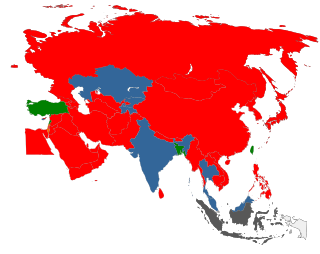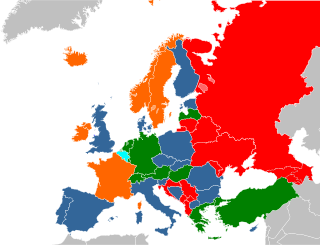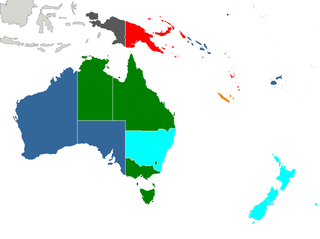Related Research Articles

The legality of prostitution in Asia varies by country. There is often a significant difference in Asia between prostitution laws and the practice of prostitution. In 2011, the Asian Commission on AIDS estimated there were 10 million sex workers in Asia and 75 million male customers.
Prostitution in Greece is legal at the age of 18, and regulated. It is estimated that fewer than 1,000 women are legally employed as prostitutes and approximately 20,000 women, half of whom are of foreign origin and the other half are Greek, are engaged in illegal prostitution. Many women affected by the economic crisis have turned to prostitution through poverty.
Prostitution in Ecuador is legal and regulated, as long as the prostitute is over the age of 18, registered, and works from a licensed brothel. Prostitution is widespread throughout the country. Many brothels and prostitutes operate outside the regulatory system and the regulations have been less strictly enforced in recent years. 25,000 prostitutes were registered in the year 2000. In 2007 it was estimated that 70% of the prostitutes in the country were from Colombia. The country attracts Colombian prostitutes as the currency is the US$ rather than the unstable Colombian peso. UNAIDS estimate there to be 35,000 prostitutes in the country.
Prostitution in Paraguay is legal for persons over the age of 18, but related activities such as brothel keeping are prohibited. Prostitution is common in the country. Brothels are also common, even some rural villages have a small bar/brothel on the outskirts.
Prostitution in Luxembourg is in itself legal, and is common, but activities associated with organised prostitution, such as profiting from or aiding prostitution, are illegal. Human trafficking incurs severe penalties. There are estimated to be 300 prostitutes in Luxembourg, most of whom are immigrants.
Prostitution in El Salvador is not prohibited by national law, but may be prohibited by local municipal ordinances. Municipal ordinances may also prohibit the purchase of sexual services. Related activities such as facilitating, promoting or giving incentives to a person to work as a prostitute (pimping) are illegal. The prostitution of children is also illegal. Brothel ownership, however, is legal. There are no specific laws against human trafficking, but any criminal offence that includes ‘commerce in women or children’ requires sentencing to be increased by 30%.

Women in Kyrgyzstan traditionally had assigned roles, although only the religious elite sequestered women as was done in other Muslim societies. Rural inhabitants continue the traditional Siberian tribal practice of bride kidnapping. Bride kidnapping, known as ala kachuu, girls as young as 12 years old are kidnapped for forced marriage, by being captured and carried away by groups of men or even relatives who, through violence or deception, take the girl to the abductor's family who forces and coerces the young woman to accept the illegal marriage. In most cases, the young woman is raped immediately in the name of marriage.[8]
Prostitution in Trinidad and Tobago is legal but related activities such as brothel keeping, soliciting and pimping are illegal.

The legality of prostitution in Europe varies by country.
Prostitution in Albania is illegal.
Prostitution in Croatia is illegal but common. Forcible prostitution, any kind of brothels, or procuring are treated as a felony, while voluntary prostitution is considered to be infraction against public order. Like in many other Southeast European countries, the problem of human trafficking for the purposes of sex is big in Croatia.
Prostitution in Armenia is illegal under administrative law. Related activities such as running a brothel and pimping are prohibited by the Criminal Code, although there are known to be brothels in the capital, Yerevan, and in Gyumri. According to UNESCO, since the collapse of the Soviet Union in 1991, prostitution in the country has grown. There are about 5,600 women involved in prostitution in Armenia, roughly 1,500 of them are in Yerevan. However, official police figures are far lower, for example 240 in 2012. Police and other safety forces reportedly tolerate prostitution. Many women turn to prostitution due to unemployment.
The Kyrgyz Republic is a source, transit, and to a lesser extent a destination country for men and women trafficked from Uzbekistan, Tajikistan, and Turkmenistan for purposes of forced labor and commercial sexual exploitation. Men and women are trafficked to Kazakhstan for forced agricultural labor—mainly in tobacco fields—to Russia for forced construction work, and to China for bonded labor. Kyrgyz and foreign women are trafficked to the U.A.E., China, Kazakhstan, South Korea, Italy, Turkey, Greece, Cyprus, Thailand, Germany, and Syria for sexual exploitation.
Prostitution in Rwanda is illegal in all aspects. Prostitutes, clients and any involved third parties are criminalised by the country's Penal Code. However, a draft of a new Penal Code that does not prohibit prostitution was presented for debate in the Rwandan Parliament in December 2017.
Prostitution in Namibia is legal and a highly prevalent common practice. Related activities such as solicitation, procuring and being involved in the running of a brothel are illegal. A World Bank study estimated there were about 11,000 prostitutes in Namibia.
Prostitution in Botswana is not illegal, but laws such as public disorder, vagrancy, loitering and state recognised religious provisions are used to prosecute prostitutes. Related activities such as soliciting and brothel keeping are illegal. Botswana has made proposals to make prostitution legal to prevent the spread of AIDS. However, there has been mass opposition to it by the Catholic Church. Prostitution is widespread and takes place on the street, bars, hotels, brothels and the cabs of long-distance trucks.

Prostitution in Oceania varies greatly across the region. In American Samoa, for instance, prostitution is illegal, whereas in New Zealand most aspects of the trade are decriminalised.
Prostitution in Fiji is legal, but most activities connected with it are illegal: brothel keeping, pimping and buying or selling sex in public. Street workers make up the bulk of Fiji's prostitutes. Many of the prostitutes are Asian, especially Chinese that provide sexual services for the growing number of tourists arriving in the country and also locals. Some come into the country on student visas. In 2014, it was estimated that there were 857 sex workers in Fiji. Even though buying and selling sex in public is illegal in Fiji, police have no legal authority to arrest prostitutes without an official report being lodged for the police to take action.
Prostitution in Papua New Guinea is generally regarded as illegal but widely practiced with the laws rarely enforced. Prostitution occurs on the streets, in bars, brothels and in logging, mining, and palm oil areas. In 2010 it was estimated there were 2.000 prostitutes in the capital, Port Moresby. The drought in 2016 caused a rise in prostitution. Many of the women have turned to sex work due to poverty or unemployment.
Prostitution in Antigua and Barbuda is legal and common. Related activities such as brothel keeping and solicitation are prohibited. UNAIDS estimate there to be 755 prostitutes on the islands, the majority are migrants from other Caribbean countries. They tend to move around the Caribbean, never staying in one territory for long. In 2011, prostitution was on the rise due to poor economic conditions.
References
- ↑ "Joint Submission for the 60th Session of the Convention on the Elimination of Discrimination against Women (CEDAW)" (PDF). United Nations Human Rights. 2014. Retrieved 23 January 2018.
- ↑ "2008 Human Rights Report: Kyrgyz Republic". State.gov. 25 February 2009. Archived from the original on 26 February 2009. Retrieved 25 July 2012.
- ↑ "100 Countries and Their Prostitution Policies - Legal Prostitution - ProCon.org". Procon. Retrieved 23 January 2018.
- 1 2 "Kyrgyzstan 2016 Country factsheet". UNAIDS . Retrieved 23 January 2018.
- 1 2 3 "Forced Health Checks for Sex Workers in Kyrgyzstan". 24.kg (in Russian). 17 February 2014. Retrieved 23 January 2018.
- ↑ "KYRGYZSTAN: Rise in prostitution threatens to fuel jump in HIV/AIDS". IRIN . Retrieved 2011-09-16.
- 1 2 3 4 5 "Kyrgyz Republic 2017 Trafficking in Persons Report". U.S. Department of State. Archived from the original on 3 July 2017. Retrieved 23 January 2018.
 This article incorporates text from this source, which is in the public domain .
This article incorporates text from this source, which is in the public domain . - ↑ Lochner, Adriane (16 May 2014). "Kyrgyzstan: Vice Squad Driving Sex Work Underground". Eurasianet. Retrieved 23 January 2018.
- 1 2 3 "Tais Plus, Kyrgyzstan". Sex Workers' Rights Advocacy Network (SWAN). 12 April 2006. Retrieved 23 January 2018.
- ↑ "Таис Плюс / Tais Plus". Global Network of Sex Work Projects (in Spanish). 24 November 2010. Retrieved 23 January 2018.
- ↑ "Nothing about us without us" (PDF). ICRSE. Retrieved 23 January 2018.